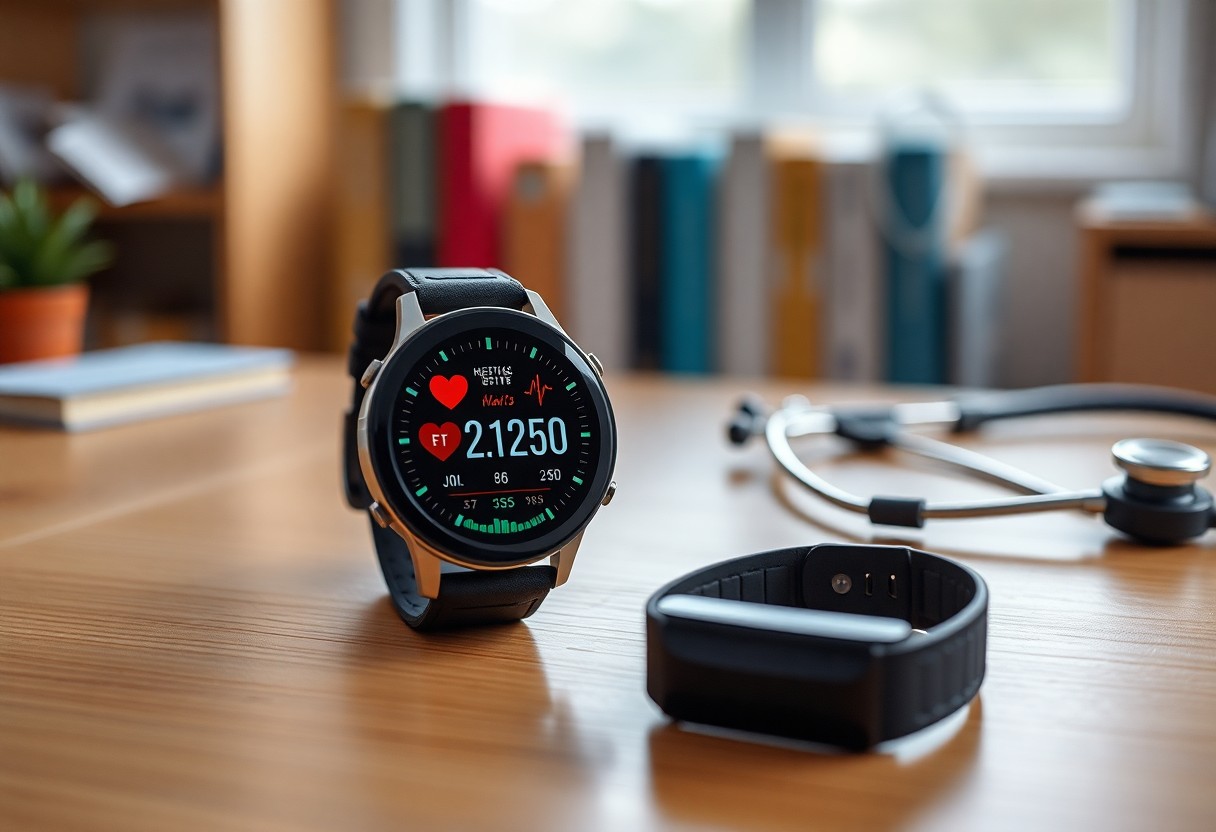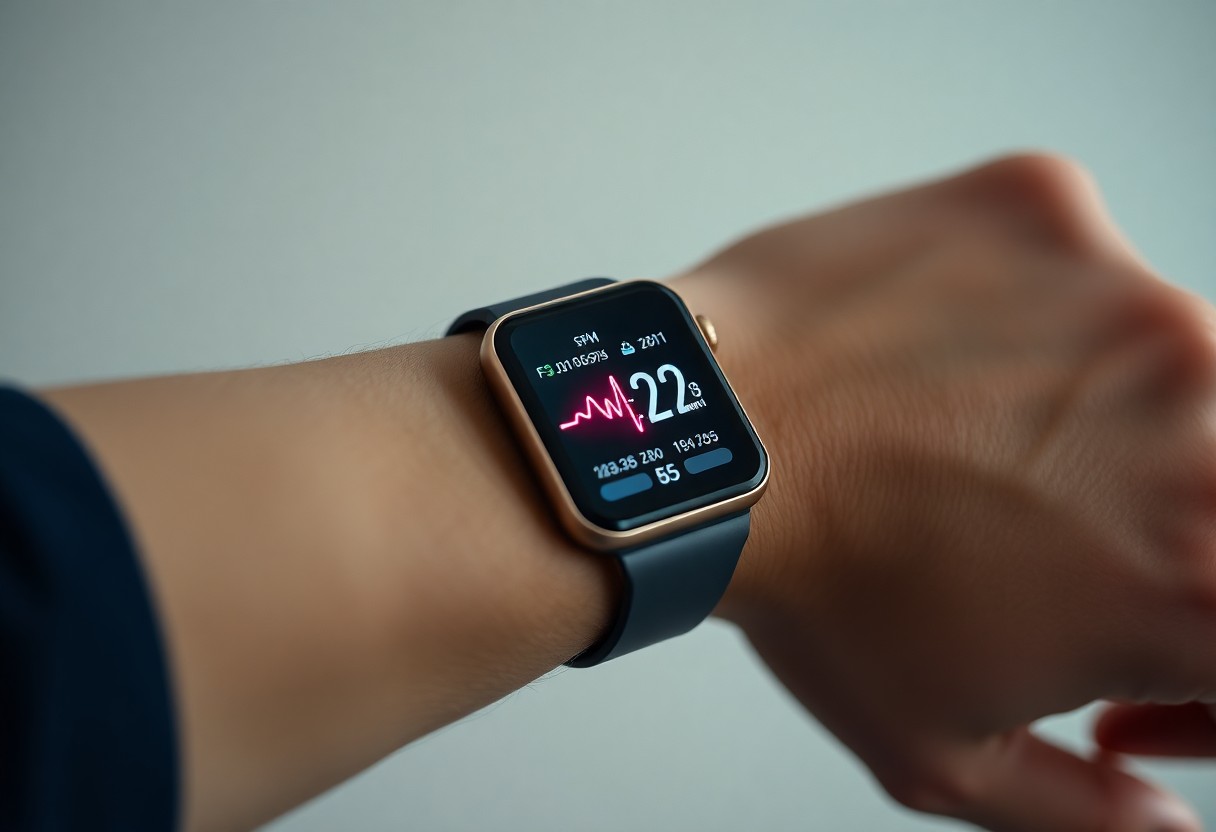Wearable technology is transforming the healthcare landscape, offering you the chance to monitor your health in real-time. With advancements in devices like smartwatches and fitness trackers, you can track vital signs, physical activity, and even sleep patterns right from your wrist. This post explores the potential of wearable health tech, the benefits it offers, and the challenges it may face in becoming an imperative part of your healthcare routine. Discover how this innovative technology can empower you to take control of your health like never before.

Key Takeaways:
- Wearable health technology has advanced significantly, offering real-time monitoring of vital signs and health metrics.
- The integration of AI and machine learning can enhance the accuracy and predictive capabilities of wearable devices.
- User engagement and adherence to using these devices are vital for collecting meaningful health data.
- Data privacy and security remain major concerns, necessitating strict regulations and user awareness.
- Future developments may include deeper integration with healthcare systems, improving preventative care and treatment outcomes.
The Current Landscape of Wearable Health Technology
The wearable health technology market has flourished, currently valued at over $60 billion and projected to exceed $130 billion by 2026. Devices such as smartwatches, fitness trackers, and health monitors have evolved significantly, offering users real-time insights into their health metrics. Companies like Fitbit, Apple, and Garmin lead the charge, integrating sophisticated sensors that track heart rate, sleep patterns, and even blood oxygen saturation, empowering you to take a proactive approach to your health.
Breakthrough Devices Revolutionizing Health Monitoring
Innovative devices like the Continuous Glucose Monitor (CGM) are re-defining health monitoring. For instance, the Dexcom G6 allows diabetics to track glucose levels without finger-pricking, providing data directly to smartphones. On the other hand, the Apple Watch Series 7’s ECG feature alerts you to irregular heart rhythms, effectively putting advanced medical technology at your fingertips, and fostering a lifestyle of preventive care.
Integration of Wearables into Everyday Life
Wearable devices have seamlessly integrated into your daily routine, enhancing how you engage with your health. Many individuals now routinely wear smartwatches not just for timekeeping but as crucial tools for managing fitness goals and health metrics throughout the day. From step counting during your walk to monitoring your heart rate during workouts, these devices have become invaluable companions that fit naturally into your lifestyle.
This integration extends beyond traditional fitness tracking; wearables now support a range of functionalities like sleep analysis and stress management. For instance, a smartwatch may prompt you to practice deep breathing during stressful moments, making it easier for you to maintain mental well-being. Furthermore, health apps paired with wearables, such as MyFitnessPal or sleep trackers, help you analyze trends and make informed lifestyle choices. The result is a comprehensive health management that aligns with your everyday habits, fostering not just awareness but active participation in your personal health journey.
Data Privacy: The Double-Edged Sword
The promise of wearable health tech comes with significant concerns surrounding data privacy. As these devices collect extensive personal health information, from heart rates to sleep patterns, questions arise about who owns and controls this sensitive data. With major data breaches occurring across industries, the fear of unauthorized access to your health information looms large. Balancing the need for insight and the maintenance of personal security creates a complex dilemma for users and developers alike.
The Compromise Between Insight and Personal Security
In the quest for enhanced health insights, you may inadvertently trade off your personal security. Wearables have the potential to provide real-time health analytics, enabling proactive measures for improving well-being. Yet, the accumulation of sensitive data can lead to vulnerabilities, where hackers might exploit your information for malicious intent. Finding a way to harness the benefits while ensuring robust data protection measures is vital for fostering user trust.
Regulatory Challenges Facing Wearable Tech
Navigating the regulatory landscape presents a significant challenge for wearable health technology. Current laws often lag behind the rapid advancements in tech, leading to uncertainties surrounding compliance. The nature of health data means it must adhere to strict standards, such as HIPAA in the United States, but many wearable manufacturers still lack full clarity on their obligations. As the sector evolves, policymakers face the task of creating comprehensive regulations that protect consumers without stifling innovation.
With wearable health devices emerging at an unprecedented speed, regulatory frameworks struggle to keep pace. For instance, while devices that merely track fitness metrics may have fewer restrictions, those that offer medical grade functionalities require oversight akin to that of pharmaceuticals. Agencies like the FDA are working to provide guidance, yet the patchwork of regulations across different regions and evolving technologies complicates matters. This uncertainty can hinder the market potential for developers seeking to offer cutting-edge solutions while ensuring compliance with necessary security protocols.

The Role of AI in Personalized Health Insights
AI plays a transformative role in delivering personalized health insights tailored to your unique needs. By analyzing vast datasets generated from wearable health tech, machine learning models can predict trends and deliver actionable recommendations based on your specific health metrics. With algorithms processing factors like heart rate variability, sleep patterns, and physical activity levels, you gain a deeper understanding of your health journey, empowering you to make informed lifestyle choices.
Transformative Algorithms and Their Impact
Advanced algorithms are reshaping the healthcare landscape by providing insights that adapt to your lifestyle and health changes. These algorithms not only identify patterns but also predict potential challenges, enhancing preventative measures. For instance, models can forecast fluctuations in blood sugar for diabetics, allowing for timely dietary adjustments, which can positively influence your daily routines.
Potential Risks of Relying on AI-Driven Recommendations
While AI-driven recommendations offer significant benefits, there are inherent risks in placing complete trust in these systems. Over-reliance may lead you to overlook important medical advice or make decisions based on incomplete data. Additionally, algorithms can suffer from biases which might skew results, underscoring the necessity for a balanced approach alongside traditional medical consultation.
A key concern is the validity of algorithms which, if not rigorously validated, may provide inaccurate insights. For instance, if an algorithm misinterprets a spike in heart rate caused by a temporary condition as a chronic issue, it could lead you to unnecessary stress or treatments. Moreover, privacy issues surrounding your personal health data should not be underestimated, as any breaches could expose sensitive information. To safeguard your health, a collaborative approach with healthcare professionals is vital, ensuring AI enhances, rather than dictates, your wellness journey.
The Future of Wearable Health Tech: Beyond Fitness
Wearable health technology is poised for a transformation that extends far beyond tracking steps and calories. New advancements promise to redefine healthcare delivery, enabling a shift toward more personalized, continuous monitoring of health metrics. You’re likely to witness devices that integrate seamlessly into everyday life, offering real-time insights that can influence day-to-day decision-making, treatment options, and health outcomes.
Innovative Uses in Chronic Disease Management
Chronic diseases, affecting millions globally, stand to benefit significantly from wearable health tech. Devices designed specifically for monitoring conditions like diabetes can provide real-time glucose readings, allowing for immediate adjustments to insulin doses. You might find wearables that send alerts to healthcare providers if any irregularities are detected, ensuring timely intervention and reducing hospital visits.
The Promise of Preventative Healthcare Solutions
Preventative healthcare is becoming increasingly vital as the focus shifts from treating illness to avoiding it. Wearable technology can help identify risk factors by monitoring vital signs, sleep patterns, and stress levels, giving you insights into your overall health. For instance, wearables that track blood pressure and heart rates can alert you to potential health risks long before they escalate into serious conditions.
As wearables evolve, the potential for preventative healthcare solutions becomes clearer. You’re looking at devices that can analyze your lifestyle habits against health benchmarks, proactively suggesting changes that could reduce disease risk. For example, smartwatches now feature heart health monitoring that can detect arrhythmias, prompting users to seek medical advice before the condition worsens. The incorporation of AI in wearables allows for even smarter analytics that can tailor recommendations to your unique health profile, enhancing your wellness journey.
The Human Element: How Tech Affects Behavior
Your interaction with wearable health tech isn’t just about numbers and data; it profoundly influences your behavior and choices. With constant access to your health metrics, you become more aware of your daily habits, leading to informed decisions about your diet, exercise, and overall well-being. This awareness can be a double-edged sword, motivating you to strive for better health while sometimes inducing anxiety about perceived shortcomings.
Motivational Insights from Wearable Data
The data collected by wearable devices can serve as a powerful motivator. For example, seeing daily step counts or heart rate fluctuations can push you to make healthier choices, like opting for the stairs instead of the elevator. Personalized health recommendations based on your activity patterns encourage goal setting, fueling a positive feedback loop that reinforces consistent healthy behaviors.
The Psychological Impact of Constant Health Monitoring
Constant health monitoring through wearables creates a dynamic relationship between technology and your mental well-being. While some individuals thrive with data-driven insights, others may experience anxiety or stress over minor fluctuations in their health metrics. For example, a slight increase in heart rate during a busy day may lead to undue concern about cardiovascular health, causing you to obsessively check your device for reassurance. Understanding this psychological landscape is crucial for maximizing the benefits of health tech while mitigating potential downsides.
Comparing self-reported stress levels among users of wearable tech can reveal significant variance; studies show that nearly 30% of regular users experience health anxiety. This hyperawareness can trigger a loop of constant checking and rechecking, leading to obsessive behaviors that could counteract the intended health benefits. Balancing this relationship requires mindfulness and limits on how often you engage with your device, ensuring that health tracking remains a supportive tool rather than a source of stress.
To wrap up
Ultimately, wearable health technology is not just possible; it is rapidly evolving and becoming an integral part of your health management. With advancements in sensors, connectivity, and data analysis, these devices can provide insights that empower you to take control of your well-being. As you explore your options, consider how these innovations can complement your lifestyle and help you achieve your health goals. Embracing wearable health tech may very well enhance your understanding of your body, leading to more informed health choices.
FAQ on Wearable Health Tech
Q: What is wearable health technology?
A: Wearable health technology refers to electronic devices that are worn on the body to monitor various health metrics such as heart rate, physical activity, sleep patterns, and even blood oxygen levels. These devices can include smartwatches, fitness trackers, heart rate monitors, and smart clothing that provide insights into an individual’s health and fitness.
Q: How can wearable health tech benefit my overall health?
A: Wearable health tech can provide numerous benefits, including real-time health monitoring, personalized fitness tracking, and motivation to maintain an active lifestyle. Data collected from these devices can help users identify health trends, detect potential health issues early, and adjust their lifestyle or diet for better wellness outcomes.
Q: Are there privacy concerns associated with wearable health technology?
A: Yes, there are privacy considerations to keep in mind. Wearable health devices often collect sensitive health data, which raises concerns about data security and how this information is shared. It is important for users to review privacy policies of the devices and applications they use, ensuring that personal health information is protected and shared only with consent.
Q: Is wearable health tech reliable for medical use?
A: While wearable health tech can provide valuable health information, its reliability can vary by device and brand. Most devices are designed for fitness monitoring and general wellness rather than diagnostic purposes. It is always advisable to consult with healthcare professionals regarding health concerns and to use wearable tech as a complementary tool in conjunction with regular medical advice.
Q: What are some limitations of wearable health technology?
A: Limitations of wearable health technology include the potential for inaccurate data due to device malfunction or improper usage, limited battery life requiring frequent recharging, and a dependency on internet connectivity for data analysis. Furthermore, users may become overly reliant on wearables for health management instead of seeking professional health care when needed.

